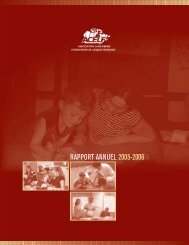Prévention des difficultés d'apprentissage en lecture - acelf
Prévention des difficultés d'apprentissage en lecture - acelf
Prévention des difficultés d'apprentissage en lecture - acelf
Create successful ePaper yourself
Turn your PDF publications into a flip-book with our unique Google optimized e-Paper software.
Prév<strong>en</strong>tion <strong>des</strong> difficultés d’appr<strong>en</strong>tissage <strong>en</strong> <strong>lecture</strong> :<br />
l’effet différ<strong>en</strong>cié d’un programme implanté par <strong>des</strong> <strong>en</strong>seignantes de maternelle chez leurs élèves<br />
MCBRIDE-CHANG, C. (1999). The ABC’s of the ABC’s: The developm<strong>en</strong>t of lettername<br />
and letter-sound knowledge. Merrill-Palmer Quarterly, 45, p. 285-308.<br />
MINISTÈRE DE L’ÉDUCATION DU QUÉBEC (2001). Programme de formation de<br />
l’école québécoise. Éducation préscolaire, <strong>en</strong>seignem<strong>en</strong>t primaire 1 er et<br />
2 ième cycles, mars 2000. Québec : Gouvernem<strong>en</strong>t du Québec.<br />
MIODUSER, D., TUR-KASPA, H. et LEITNER, I. (2000). The learning value of<br />
computer-based instruction of early reading skills. Journal of Computer<br />
Assisted Learning, 16, p. 54-63.<br />
MRAZEK, P. J. et HAGGERTY, R. J. (1994). Reducing risks for m<strong>en</strong>tal disorders:<br />
Frontiers for prev<strong>en</strong>tive interv<strong>en</strong>tion research. Washington, DC : National<br />
Academy Press.<br />
MUTER, V., HULME, C., SNOWLING, M. et TAYLOR, S. (1998). Segm<strong>en</strong>tation, not<br />
rhyming, predicts early progress in learning to read. Journal of Experim<strong>en</strong>tal<br />
Child Psychology, 71, p. 3-27.<br />
PRESSLEY, M. (1998). Reading instruction that works. The case for balanced<br />
approach. New York : The Guilford Press.<br />
RAYNER, K., FOORMAN, B. R., PERFETTI, C. A., PESETSKY, D. et SEIDENBERG,<br />
M. S. (2001). How psychological sci<strong>en</strong>ce informs the teaching of reading.<br />
A Journal of the American Psychological Society. Psychological Sci<strong>en</strong>ce in the<br />
Public Interest, 2 (2), p. 31-74.<br />
SCHNEIDER, W., ENNEMOSER, M., ROTH, E. et KÜSPERT, P. (1999). Kindergart<strong>en</strong><br />
Prev<strong>en</strong>tion of Dyslexia: Does Training in Phonological Awar<strong>en</strong>ess Work for<br />
Everybody? Journal of Learning Disabilities, 32 (5), p. 429-436.<br />
SEGERS, E. et VERHOEVEN, L. (2005). Long-term effects of computer training of<br />
phonological awar<strong>en</strong>ess in kindergart<strong>en</strong>. Journal of Computer Assisted<br />
Learning, 21, p. 17-27.<br />
SNOW, C. E., BURNS, M. S. et GRIFFIN, P. (1998). Prev<strong>en</strong>ting reading difficulties in<br />
young childr<strong>en</strong>. Washington, DC : National Academy Press.<br />
STANOVICH, K. E. (1994). Romance and reality. The Reading Teacher, 47, p. 281-291.<br />
STANOVICH, K. E. (2000). Progress in understanding reading. Sci<strong>en</strong>tific foundations<br />
and new frontiers. New York, NY : The Guilford Press.<br />
WEHBY, J.H., LANE, K.L. et FALK, K.B. (2005). An inclusive approach to improving<br />
early literacy skills of stud<strong>en</strong>ts with emotional and behavioral disorders.<br />
Behavioral Disorders, 30, p. 155-170.<br />
WORDEN, P. E. et BOETTCHER, W. (1990). Young childr<strong>en</strong>’s acquisition of alphabet<br />
knowledge. Journal of Reading Behavior, 22, p. 277-295.<br />
volume XXXIV:2, automne 2006<br />
83<br />
www.<strong>acelf</strong>.ca

















